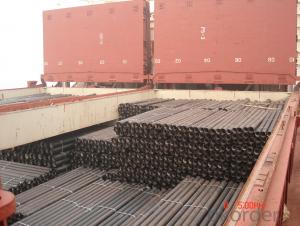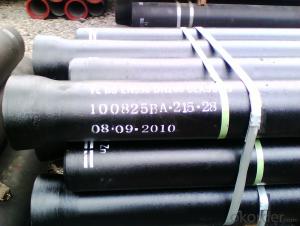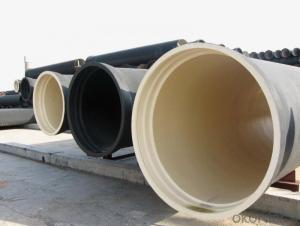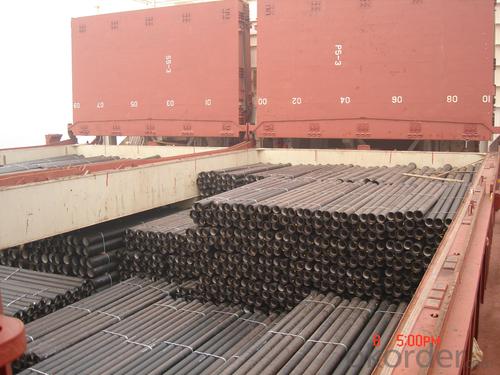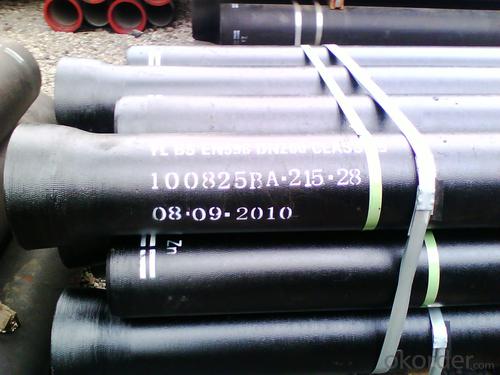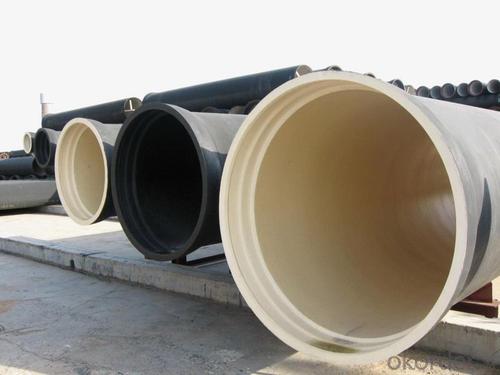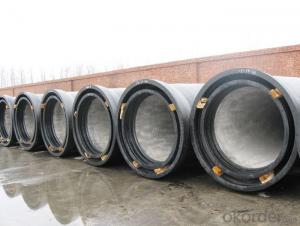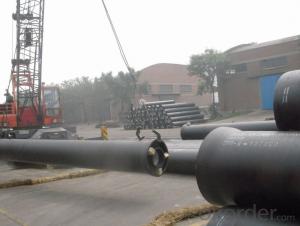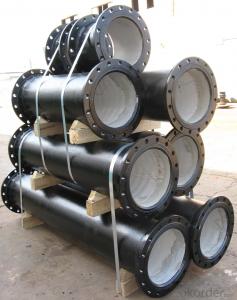Ductile Iron Pipe ISO2531:1998 C CLASS DN400
- Loading Port:
- China main port
- Payment Terms:
- TT or LC
- Min Order Qty:
- 20 m.t.
- Supply Capability:
- 200000 m.t./month
OKorder Service Pledge
OKorder Financial Service
You Might Also Like
1.Ductile Iron Pipe Description :
1) Pipes confirm to ISO2531,K9 class,T type joint,6m long,with inside cements lining conform to ISO4179, outside Zinc
spraying(130g/m2) and bitumen coating(70μm) conform to ISO8179.
2) Pipe ends: Spigot and socket ends, with 100% SBR rubber gaskets accoding to ISO4633
3) we can do third party inspection according to customer's request.
2.Main Features of the Ductile Iron Pipe:
1).Quality guarantee
• Chemical checking
• NDE after rough machining
• Mechanical testing after heat treatment
• Final NDE,dimension inspected
2).Quality document
• Full Q.A document as per client request
3).Packing and Shipping
• standard export package(carton/wooden case/pallet)
• accept FOB,FAS,CNF,CIF door to door etc or customer designated shipping agent
1. Material: Ductile iron grade 500-7/ 450-10 in accordance with ISO1083
2. Standard: ISO 2531, EN545, EN598, ANSI, AWWA
3. Certificate: ISO9001, ISO14001, SGS, NSF, WRAS
4. Test: In accordance with ISO 2531 / EN 545 / EN598 and 100% water pressure test
5. Length: 6m or cut into 5.6m, 5.7m, 5.8m
3.Ductile Iron Pipe Images:
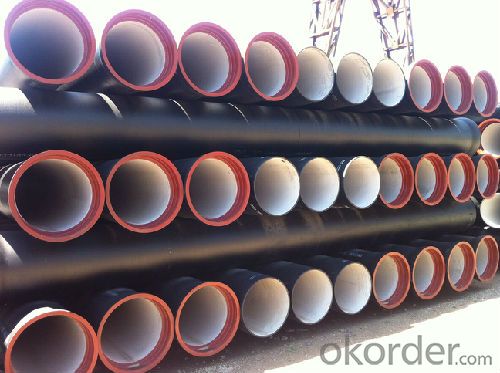
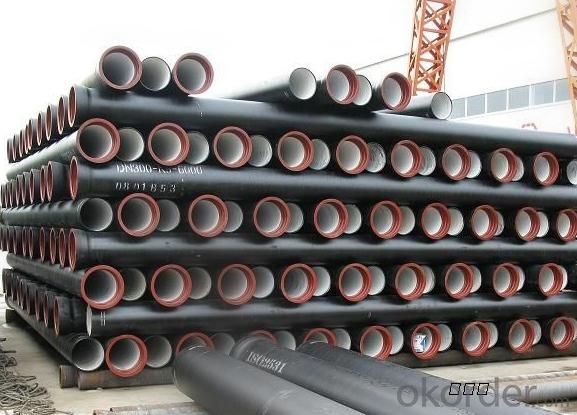
4.Ductile Iron Pipe Specification:
Internal lining: ductile iron pipes shall have an internal cement mortar lining in acc with ISO4179.
External coating: ductile iron pipes shall be externally coated with metallic zinc spray plus a further layer of resin
painting to ISO8179.
Gasket: 100% SBR/NBR/EPDM rubber gasket in accordance with ISO4633.
Packing: ductile iron pipes from DN100 to DN300 be bundled with steel belts, others are in bulk.
Payment term: L/C, T/T.
Packing: In bulk vessel or in container
5.FAQ:
We have organized several common questions for our clients,may help you sincerely:
1.Q: Why would you choose ductile iron pipe rather than other pipe materials?
A:The reasons are obvious for that not only ductile iron pipe possesses the inherent strength and flexibility of ductile
iron, combined with proven corrosion protection systems, but also the cost savings can be achieved from design to
installation and commissioning.
2.Q:Why can you guarantee the inner of pipes can’t be corroded?
A: High alumina cement mortar lining and sulphate-resistant cement mortar lining. These two special linings are applicable
to inner anti-corrosion for sewage pipes, improving resistance to erosion of the sewage components.
- Q: What is the expected noise reduction of ductile iron pipes?
- The expected noise reduction of ductile iron pipes can vary depending on various factors, such as the thickness of the pipes, the specific installation method, and the surrounding environment. However, ductile iron pipes are generally known for their ability to significantly reduce noise levels compared to other materials, thanks to their dense and robust structure that effectively dampens sound vibrations.
- Q: Are ductile iron pipes suitable for use in mining applications?
- Yes, ductile iron pipes are suitable for use in mining applications. Ductile iron, also known as nodular cast iron, is a type of iron that has been treated with magnesium or cerium to alter its microstructure, making it stronger and more flexible than traditional cast iron. This enhanced strength and ductility make ductile iron pipes highly resistant to impact, corrosion, and abrasion, which are common challenges in mining environments. In mining applications, ductile iron pipes are often used for various purposes such as water supply, slurry transportation, and ventilation systems. Their excellent durability and resistance to wear and tear make them ideal for handling abrasive materials, chemicals, and high-pressure fluids commonly found in mining operations. Furthermore, ductile iron pipes' ability to withstand heavy loads and external pressures makes them suitable for underground mining applications, where they may need to support the weight of overlying rock layers. Their high tensile strength and flexibility help prevent pipe failure and minimize the risk of leaks or breaks, ensuring the safety and efficiency of mining operations. Additionally, ductile iron pipes are relatively easy to install, maintain, and repair. They can be welded or joined using mechanical couplings, allowing for quick and efficient installation in mining sites. Their corrosion resistance also reduces the need for frequent maintenance and replacement, resulting in cost savings for mining companies. Overall, the superior mechanical properties and durability of ductile iron pipes make them a reliable and practical choice for use in mining applications.
- Q: Can ductile iron pipe be used for desalination plants?
- Yes, ductile iron pipe can be used for desalination plants. Ductile iron has excellent corrosion resistance properties, making it suitable for handling the corrosive nature of desalinated water. Additionally, its high strength and durability make it a reliable choice for transporting water in such plants.
- Q: How does ductile iron pipe perform in high-velocity flow conditions?
- Ductile iron pipe performs exceptionally well in high-velocity flow conditions. Due to its unique properties, including high tensile strength and impact resistance, ductile iron pipe can withstand the forces exerted by high-velocity flows without experiencing significant damage or failure. One of the key advantages of ductile iron pipe is its ability to resist the effects of water hammer, which is a sudden increase in pressure caused by the rapid deceleration or change in direction of water flow. This is particularly important in high-velocity flow conditions where the velocity of water is significantly higher than normal. Ductile iron pipes are designed to absorb and dissipate the energy generated by water hammer, preventing potential damage to the pipe and the surrounding infrastructure. Additionally, ductile iron pipe has excellent flow characteristics, allowing for smooth and efficient water transport even at high velocities. This is crucial in applications where a large volume of water needs to be transported quickly, such as in industrial processes or fire protection systems. The smooth interior surface of ductile iron pipe minimizes friction and pressure losses, ensuring that the water can flow freely and efficiently, reducing energy consumption and operating costs. Moreover, ductile iron pipe is highly resistant to corrosion, which is a common issue in high-velocity flow conditions where the water may contain aggressive chemicals or particulates. The protective lining and coating systems used in ductile iron pipes provide a barrier against corrosion, extending the lifespan of the pipe and maintaining its structural integrity. In summary, ductile iron pipe is well-suited for high-velocity flow conditions due to its ability to withstand water hammer, its excellent flow characteristics, and its resistance to corrosion. Its strength, durability, and reliable performance make it a preferred choice for various applications, ensuring efficient water transport even in demanding environments.
- Q: What is the manufacturing process of ductile iron pipes? Thank you
- Pig iron function: pig iron is strong, wear-resisting, good forging, but pig iron is crisp, cannot forge. Most frequently used: ductile iron covers, ductile iron pipes, ductile iron pipe fittings, ductile iron pipes are widely used in our life.
- Q: What are the disadvantages of using ductile iron pipes?
- There are several disadvantages associated with using ductile iron pipes in various applications. Firstly, ductile iron pipes tend to be more expensive compared to other types of pipes, such as PVC or HDPE. This can be a significant drawback for projects with budget constraints. Secondly, ductile iron pipes are relatively heavy, which makes transportation and installation more labor-intensive and time-consuming. This can increase the overall cost of the project, especially when considering the need for specialized equipment and a skilled workforce. Another disadvantage is that ductile iron pipes are susceptible to corrosion. Over time, exposure to various environmental factors, such as soil conditions and water chemistry, can lead to the formation of rust and scale on the inner and outer surfaces of the pipe. This can reduce the pipe's lifespan and potentially affect water quality. Furthermore, ductile iron pipes can be prone to cracking or breaking under certain conditions, especially if exposed to heavy loads or significant ground movement. This can result in costly repairs or replacements, leading to additional expenses and disruptions to the water supply. Lastly, ductile iron pipes have a relatively low resistance to impact and abrasion compared to some other materials. This means they may be more prone to damage from external forces, such as construction activities or accidental impacts, which can further increase maintenance and repair costs. Overall, while ductile iron pipes have their advantages, such as high tensile strength and durability, it is important to consider these disadvantages before deciding on their use in a particular project.
- Q: Can ductile iron pipes be used for conveying gases?
- Yes, ductile iron pipes can be used for conveying gases. Ductile iron has excellent mechanical properties and is resistant to corrosion, making it a suitable material for transporting various types of gases. Additionally, ductile iron pipes are known for their strength and durability, making them a reliable choice for gas transmission systems.
- Q: What are some common applications for ductile iron pipe?
- Ductile iron pipe, also known as DI pipe, is widely used in various applications due to its durability, strength, and corrosion resistance. Here are some common applications for ductile iron pipe: 1. Water Distribution: Ductile iron pipe is extensively used for the distribution of potable water. Its high tensile strength allows it to withstand high water pressure, making it ideal for water mains, water transmission lines, and water distribution networks. 2. Sewer Systems: Ductile iron pipe is commonly used in sewer systems due to its resistance to corrosion and its ability to handle high loads. It is often used for gravity sewer lines, force mains, and stormwater systems. 3. Industrial Applications: Ductile iron pipe finds applications in various industrial settings, including power plants, chemical plants, and refineries. It is used for the transportation of water, wastewater, and other fluids in these industries. 4. Irrigation Systems: Due to its strength and long lifespan, ductile iron pipe is suitable for irrigation systems, especially in agricultural areas. It is used to transport water for irrigation purposes, ensuring efficient water distribution in fields and farms. 5. Fire Protection Systems: Ductile iron pipe is commonly used for fire protection systems, including fire hydrants, fire sprinkler systems, and fire suppression systems. Its robustness and resistance to high pressure make it an excellent choice for reliable and effective fire protection. 6. Pumping Stations: Ductile iron pipe is often used in pumping stations, which are crucial for various water-related applications. It is employed in water intake systems, wastewater pumping stations, and water treatment plants to transport water and wastewater efficiently. 7. Municipal Infrastructure: Ductile iron pipe is widely used in municipal infrastructure projects, including road drainage systems, culverts, and bridge crossings. Its strength, durability, and resistance to external loads make it suitable for these applications. 8. Gas Distribution: Although more commonly used for water-related applications, ductile iron pipe is also used for the distribution of natural gas and other gases. It is preferred for gas distribution due to its resistance to corrosion and its ability to withstand high-pressure environments. Overall, ductile iron pipe has a wide range of applications and is preferred in situations that require strength, durability, and resistance to corrosion. Its versatility and reliability make it a popular choice for various infrastructure projects and industrial applications.
- Q: What is the content of silicon in silicon molybdenum ductile iron?
- High silicon molybdenum ductile cast iron is developed for end users successfully reduces the cost, and the castings have high strength, good oxidation resistance, and has good performance under thermal cycling condition. This kind of ductile iron silicon content of 4% molybdenum content 0.6%-0.8%, currently designated as many car manifold and turbocharger shell, and molybdenum content than the silicon alloy casting 1% more for special high temperature exhaust pipe, heat treatment. High silicon molybdenum alloy nodular cast iron castings used in the production of automotive turbocharger.
- Q: Are ductile iron pipes suitable for sewage treatment plants?
- Yes, ductile iron pipes are suitable for sewage treatment plants. Ductile iron pipes are known for their durability, strength, and corrosion resistance, making them ideal for handling the corrosive and abrasive nature of sewage. They can withstand high pressure and are capable of accommodating heavy loads and ground movements, making them a reliable choice for sewage treatment facilities. Additionally, their smooth interior surface minimizes friction, reducing the risk of clogs and improving the flow of wastewater.
Send your message to us
Ductile Iron Pipe ISO2531:1998 C CLASS DN400
- Loading Port:
- China main port
- Payment Terms:
- TT or LC
- Min Order Qty:
- 20 m.t.
- Supply Capability:
- 200000 m.t./month
OKorder Service Pledge
OKorder Financial Service
Similar products
Hot products
Hot Searches
Related keywords
